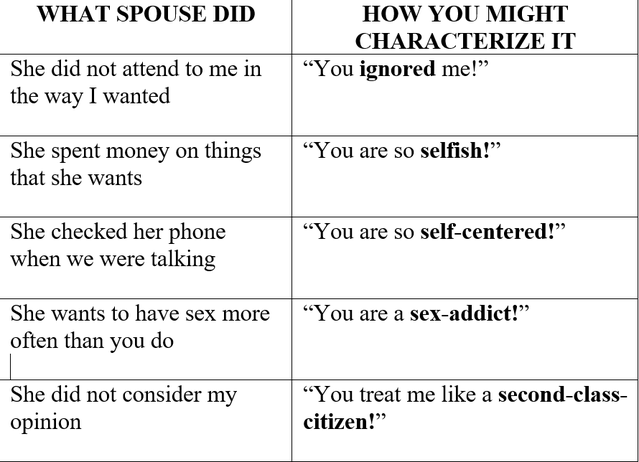Relationships
How Important Is Self-Awareness for Men?
A new approach to self-awareness.
Posted November 26, 2019 Reviewed by Davia Sills
Self-awareness is the new buzzword in the business world—aimed particularly at men who want to be leaders in their fields but find themselves lacking the leadership skills they need to be effective.
Tasha Eurich, an organizational psychologist, tells us self-awareness has become the latest business management buzzword for good reason.[1] When we look at ourselves clearly, we are more confident and more creative—making sounder decisions, communicating better, and building stronger business relationships.
Jennifer Porter, a managing partner in a leadership and team development firm, has a terrific take on self-reflection, which is how we can become more self-aware:
…The most useful reflection involves the conscious consideration and analysis of beliefs and actions for the purpose of learning. Reflection gives the brain an opportunity to pause amidst the chaos, untangle and sort through observations and experiences, consider multiple possible interpretations and create meaning. This meaning becomes learning, which can then inform future mindsets and actions.[2]
If self-awareness is so important in our business relationships, why not in our intimate relationships? Advice about self-awareness in intimate relationships often suggests setting aside time on some regular basis for a self-assessment about values, daily activities, life goals, etc. Men, in particular, will resist this path toward self-awareness, having a bias toward action rather than contemplation—not seeing how this process leads to a better relationship, relying on “facts,” valuing intellect over feelings, not following through on a plan to meditate, etc.
We need a new take on the call for the kind of self-reflection that produces the desired self-awareness.
What Are Your Triggers?
Instead of approaching self-awareness by some general strategy about life planning, how about a situation-specific strategy—a way to identify situations that are “triggers” to be self-reflective rather than reactive.
Differences, Disagreements, and Conflicts as Triggers
In supportive, intimate relationships, differences and disagreements are usually handled through a negotiation process that begins with “putting things on the table” so that the partners can see where the differences are. The best negotiations result in “win-win” outcomes, such that each partner’s wishes and wants are heard and honored in the outcome.[3]
Conflicts are different. They often start out as a request, a comment, a difference, a disagreement. However, soon you are not talking to each other—you are yelling, avoiding, talking over each other, etc. When this happens, issues will not be resolved, because you are making assumptions that are hidden, and the thoughts and feelings you have are strong and negative.
The first clue that you are setting yourself up for a conflict with your spouse/partner is how you are feeling. If you feel angry with your spouse, you are set to blame her, e.g., “I’m angry because you are not doing your fair share.” In this situation, something she did (or failed to do) has “caused” you to be angry at her. You think it is “normal” for you to be angry because she did not do what she had agreed to do.
This scenario of thinking your spouse caused you to be angry (or fearful or hurt) and describing this as normal is truly your part in creating a conflict. While such an angry reaction may be “reflexive,” calling it “normal” simply justifies your reaction.
Self-Reflection Is the Only Way to Resolve Conflict
The way to resolve conflict is for each person to be self-reflective and personally accountable for his/her part in the breakdown of the interaction at hand. Here are the steps you can take to increase your self-awareness in order to avoid altogether or resolve conflicts in your intimate relationship.
1. Enhance Your Emotional Intelligence. You know that anger and fear ready you for a fight or flight reaction. Daniel Goleman, who introduced the idea of emotional intelligence, views such emotions as a “quick response system” that pushes you to react without appropriate reflection on what is occurring.[4] Recall that anger and fear are associated with the release of epinephrine (adrenaline), norepinephrine, and dopamine, all of which ready you to fight or flee.
Psychiatrist David Viscott describes all the ways we camouflage our anger by expressing it as being irritated, miffed, teed off, irked, annoyed, furious, enraged, and burned.[5] Fear can be expressed as being scared, edgy, jittery, concerned, worried, helpless, insecure, uptight, nervous, having cold feet, and getting the shakes. These are the words we use typically to avoid copping to being angry or fearful—to deflect.
Developing emotional intelligence means being aware of your own “quick response system.” You must own it.
2. Recognize Your Personal Take on the Situation. Goleman says that because of the “quick response system,” you will make a quick interpretation of what is happening between you and your spouse. This will be a personalized interpretation based more on your own history than on the current situation. All of us bring our personal histories (painful and joyful) with us into our marriage. When your personal history affects your view of the situation, you will characterize your spouse’s action in view of what it means to you personally, rather than describing it objectively.
Say you come home for work one evening, ready to fix dinner with your wife. You find out that she has not gone grocery shopping on the way home as she had agreed to do. She wants to go out to eat!
Your quick response system goes into action, and you say, “I am so angry that you are not doing your fair share of the work.” You may even add something like—“You are such a shirker!” Your spouse will rarely if ever experience her action in the same way that you characterize it. She just changed her mind! The sense of “unfairness” in this example is your personal experience of the situation.
Characterizing an action is not the same thing as describing it. Characterizing is never about the event—her not going to the store—it’s about a personal betrayal! And, characterizing your partner’s action will surely provoke her counter-reaction and counter characterization (“You are such a bully!”). Now, it is a full-fledged conflict!
Here are a few examples of the difference between describing what happens and characterizing what happens.

Being Personally Accountable
Being accountable means using your self-awareness to communicate better with your spouse—acknowledging that you are reacting, not interacting. Being accountable also means being aware that your words and actions have an impact on others, on your spouse.
Self-awareness will build a stronger relationship with your partner if you can recognize when you are angry, irritated, peeved, hurt, upset, or annoyed at her—recognizing that you are reacting reflexively. Know that without reflecting on what is happening, you will quickly and automatically characterize her as having some negative trait that presumably caused her to act badly toward you (she is selfish, lazy, bossy, messy, inconsiderate, emasculating, and on and on). She will never agree with such a characterization!
What’s the Payoff?
Self-reflection helps you identify the problem at hand. The self-awareness achieved by self-reflection leads you to describe your concerns to your spouse, rather than characterizing her action or lack of action.
Characterizing is never positive when you are reacting—it is always negative—and likely to provoke a reaction-in-kind. You can negotiate a disagreement or difference about what happened when it is described. You do not negotiate conflict! You retaliate for a perceived personal injustice!
Like our business consultants point out, when you see yourself more clearly—recognize when you are reacting rather than interacting—you will make sounder decisions, communicate better, and do your part in building a more satisfying relationship with your spouse/partner.
Takeaways
- Self-awareness in business helps leaders become confident, communicate better, and build stronger relationships.
- Self-awareness has the same effect on your intimate relationship.
- A new approach to achieving self-awareness is to identify your trigger situations by paying attention to when you are angry, anxious, or hurt.
- Self-reflection allows you to describe a problem not characterize your spouse in negative terms.
- A problem well described is negotiable.
- Characterizing your spouse is provocative.
References
1. Eurich, Tasha. “What Self-Awareness Really Is (And How to Cultivate It). Harvard Business Review. January 4, 2018. https://hbr.org/2018/01/what-self-awareness-really-is-and-how-to-cultiv….
2. Porter, Jennifer. “Why You Should Make Time for Self-Reflection (Even if You Hate Doing It). Harvard Business Review. March 21, 2017. https://hbr.org/2017/03/why-you-should-make-time-for-self-reflection-ev….
3. Aponte, Catherine E. (2019) A Marriage of Equals: How to Achieve Balance in a Committed Relationships. Berkeley, CA: She Writes Press.
4. Goleman, Daniel. Emotional Intelligence. New York: Bantam Books, 1995.
5. Viscott, David. The Language of Feelings. (n.p.) Priam Books, 1976.




